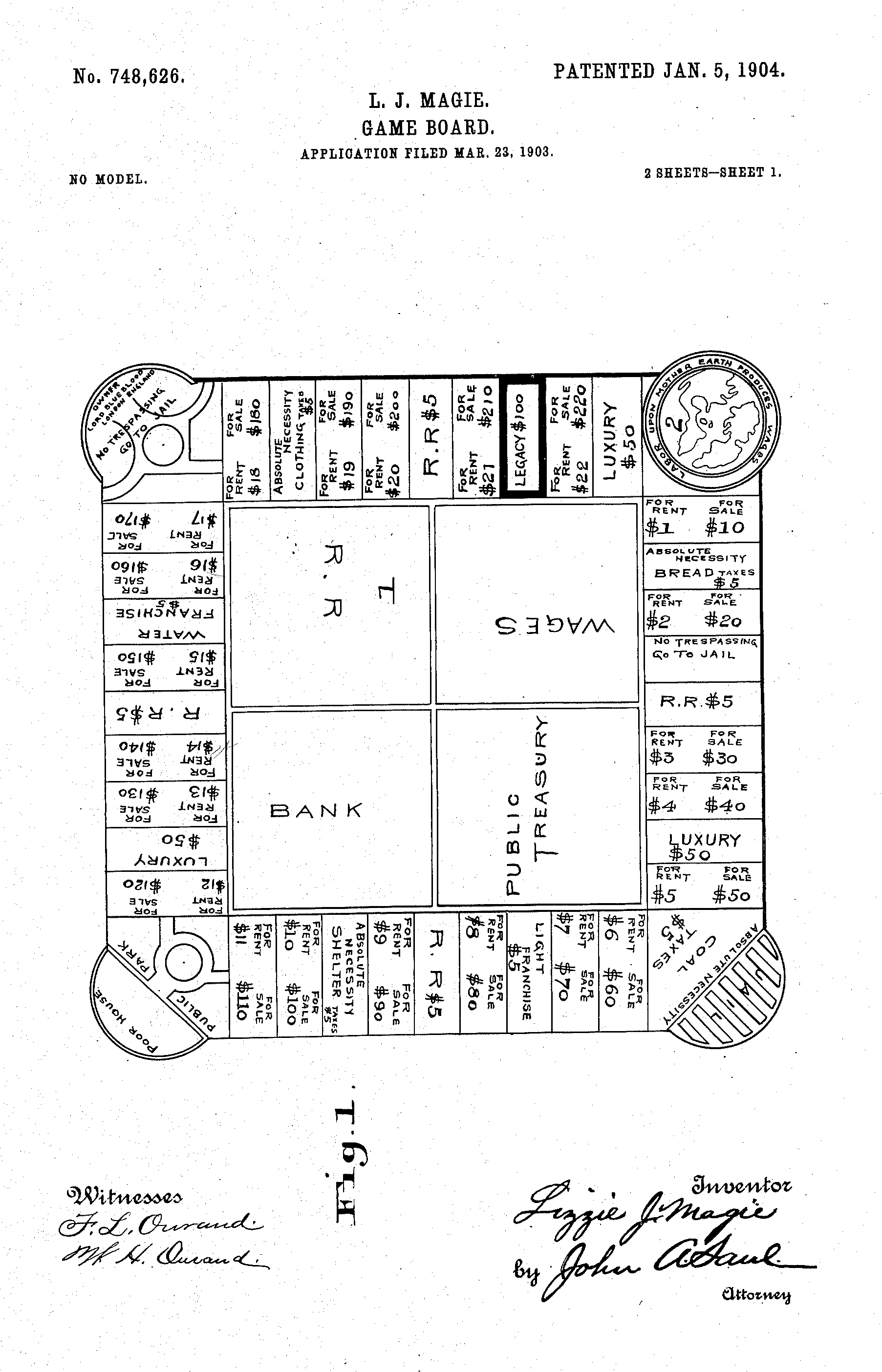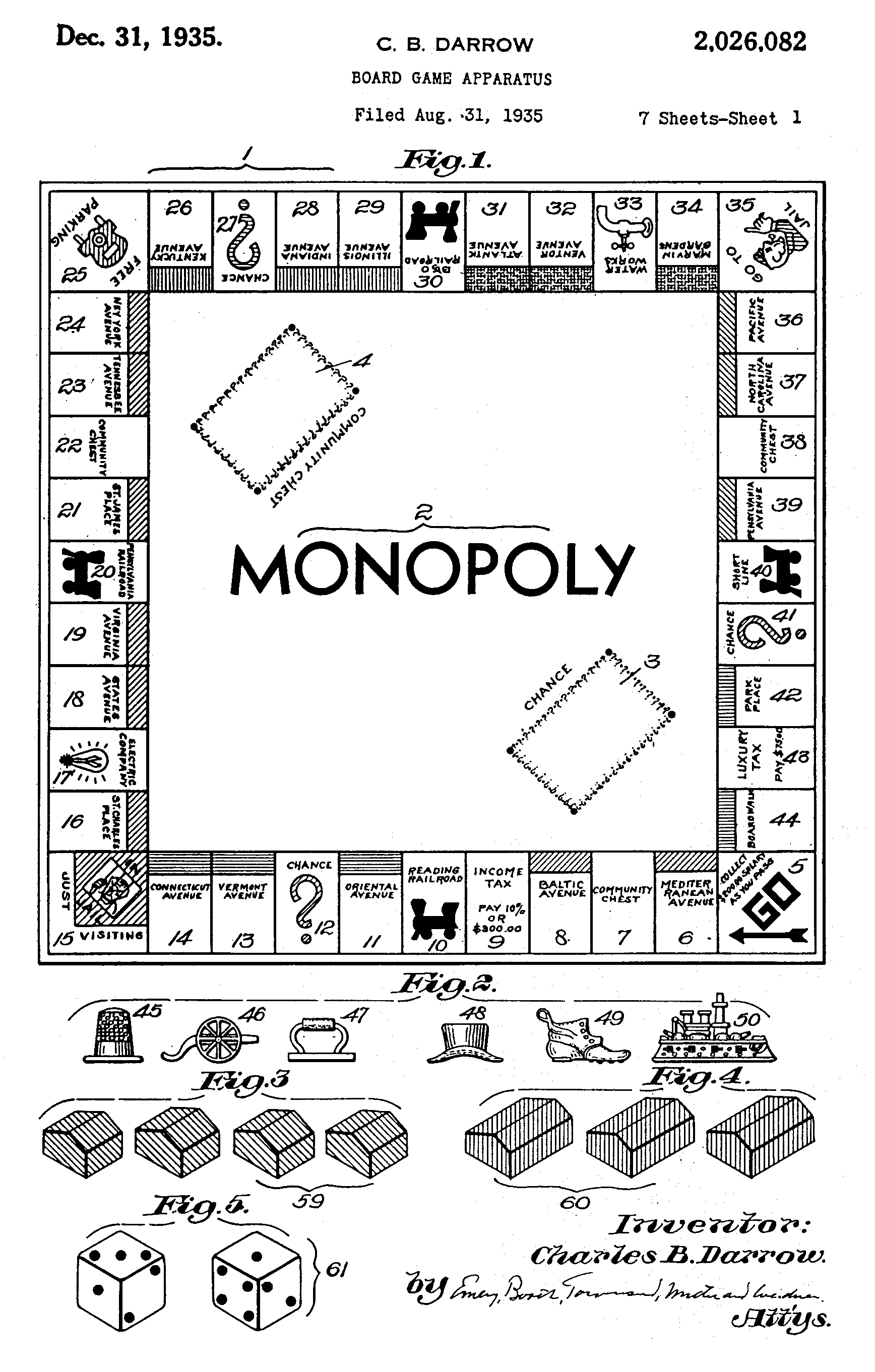|
Don't Go To Jail
''Don't Go to Jail'' is a 1991 Parker Brothers dice game for two or more players inspired by ''Monopoly''. The game is played by rolling ten dice and attempting to roll matches to score points. Seven of the dice have various colors, utilities, or railroad icons on them (all from the ''Monopoly'' board game Board games are tabletop games that typically use . These pieces are moved or placed on a pre-marked board (playing surface) and often include elements of table, card, role-playing, and miniatures games as well. Many board games feature a co ...). The remaining three dice are blank on four sides, with the other two sides showing "Go," "to", or "jail". The player scores points for the round if the dice rolled create a monopoly set of colors, utilities, or railroads. The number of dice that need to score points depends on the property. If a die shows the "Go To Jail" icon, that die is placed aside. The player can continue re-rolling unmatched dice until they decide to end ... [...More Info...] [...Related Items...] OR: [Wikipedia] [Google] [Baidu] |
Monopoly Logo 123
A monopoly (from Greek el, μόνος, mónos, single, alone, label=none and el, πωλεῖν, pōleîn, to sell, label=none), as described by Irving Fisher, is a market with the "absence of competition", creating a situation where a specific person or enterprise is the only supplier of a particular thing. This contrasts with a monopsony which relates to a single entity's control of a market to purchase a good or service, and with oligopoly and duopoly which consists of a few sellers dominating a market. Monopolies are thus characterized by a lack of economic competition to produce the good or service, a lack of viable substitute goods, and the possibility of a high monopoly price well above the seller's marginal cost that leads to a high monopoly profit. The verb ''monopolise'' or ''monopolize'' refers to the ''process'' by which a company gains the ability to raise prices or exclude competitors. In economics, a monopoly is a single seller. In law, a monopoly is a business ... [...More Info...] [...Related Items...] OR: [Wikipedia] [Google] [Baidu] |
Parker Brothers
Parker Brothers (known by Parker outside of North America) was an American toy and game manufacturer which in 1991 became a brand of Hasbro. More than 1,800 games were published under the Parker Brothers name since 1883. Among its products were ''Monopoly (game), Monopoly'', Cluedo, Clue (licensed from the British publisher and known as ''Cluedo'' outside of North America), ''Sorry! (game), Sorry!'', ''Risk (game), Risk'', ''Trivial Pursuit'', ''Ouija'', ''Aggravation (board game), Aggravation'', ''Bop It'', ''Scrabble'' (under a joint partnership with Milton Bradley Company, Milton Bradley in North America and Canada), and ''Probe (parlor game), Probe''. The trade name became defunct with former products being marketed under the "Hasbro Gaming" label with the logo shown on Monopoly (game), Monopoly games. History Parker Brothers was founded by George Swinnerton Parker, George S. Parker. Parker's philosophy deviated from the prevalent theme of board game design; he believed th ... [...More Info...] [...Related Items...] OR: [Wikipedia] [Google] [Baidu] |
Dice Game ...
Dice games are games that use or incorporate one or more dice as their sole or central component, usually as a random device. The following are games which largely, if not entirely, depend on dice: Collectible dice games Patterned after the success of collectible card games, a number of collectible dice games have been published. Although most of these collectible dice games are long out-of-print, there is still a small following for many of them. Some collectible dice games include: *'' Battle Dice'' *'' Diceland'' *''Dragon Dice'' *''Dice Masters'' See also *Card game References {{Tabletop games by type Dice Dice (singular die or dice) are small, throwable objects with marked sides that can rest in multiple positions. They are used for generating random values, commonly as part of tabletop games, including dice games, board games, role-playing g ... [...More Info...] [...Related Items...] OR: [Wikipedia] [Google] [Baidu] |
Monopoly (game)
''Monopoly'' is a multi-player economics-themed board game. In the game, players roll two dice to move around the game board, buying and trading properties and developing them with houses and hotels. Players collect rent from their opponents, aiming to drive them into bankruptcy. Money can also be gained or lost through ''Chance'' and ''Community Chest'' cards and tax squares. Players receive a stipend every time they pass "Go" and can end up in jail, from which they cannot move until they have met one of three conditions. House rules, hundreds of different editions, many spin-offs, and related media exist. ''Monopoly'' has become a part of international popular culture, having been licensed locally in more than 103 countries and printed in more than 37 languages. , it was estimated that the game had sold 275 million copies worldwide. ''Monopoly'' is derived from ''The Landlord's Game'', created by Lizzie Magie in the United States in 1903 as a way to demonstrate that an economy ... [...More Info...] [...Related Items...] OR: [Wikipedia] [Google] [Baidu] |
Board Game
Board games are tabletop games that typically use . These pieces are moved or placed on a pre-marked board (playing surface) and often include elements of table, card, role-playing, and miniatures games as well. Many board games feature a competition between two or more players. To show a few examples: in checkers (British English name 'draughts'), a player wins by capturing all opposing pieces, while Eurogames often end with a calculation of final scores. '' Pandemic'' is a cooperative game where players all win or lose as a team, and peg solitaire is a puzzle for one person. There are many varieties of board games. Their representation of real-life situations can range from having no inherent theme, such as checkers, to having a specific theme and narrative, such as ''Cluedo''. Rules can range from the very simple, such as in snakes and ladders; to deeply complex, as in ''Advanced Squad Leader''. Play components now often include custom figures or shaped counters, and distin ... [...More Info...] [...Related Items...] OR: [Wikipedia] [Google] [Baidu] |
Express Monopoly
''Monopoly'' is a multi-player economics-themed board game. In the game, players roll two dice to move around the game board, buying and trading properties and developing them with houses and hotels. Players collect rent from their opponents, aiming to drive them into bankruptcy. Money can also be gained or lost through ''Chance'' and ''Community Chest'' cards and tax squares. Players receive a stipend every time they pass "Go" and can end up in jail, from which they cannot move until they have met one of three conditions. House rules, hundreds of different editions, many spin-offs, and related media exist. ''Monopoly'' has become a part of international popular culture, having been licensed locally in more than 103 countries and printed in more than 37 languages. , it was estimated that the game had sold 275 million copies worldwide. ''Monopoly'' is derived from ''The Landlord's Game'', created by Lizzie Magie in the United States in 1903 as a way to demonstrate that an econom ... [...More Info...] [...Related Items...] OR: [Wikipedia] [Google] [Baidu] |
Dice Games ...
Dice games are games that use or incorporate one or more dice as their sole or central component, usually as a random device. The following are games which largely, if not entirely, depend on dice: Collectible dice games Patterned after the success of collectible card games, a number of collectible dice games have been published. Although most of these collectible dice games are long out-of-print, there is still a small following for many of them. Some collectible dice games include: *'' Battle Dice'' *'' Diceland'' *''Dragon Dice'' *''Dice Masters'' See also *Card game References {{Tabletop games by type Dice Dice (singular die or dice) are small, throwable objects with marked sides that can rest in multiple positions. They are used for generating random values, commonly as part of tabletop games, including dice games, board games, role-playing g ... [...More Info...] [...Related Items...] OR: [Wikipedia] [Google] [Baidu] |




